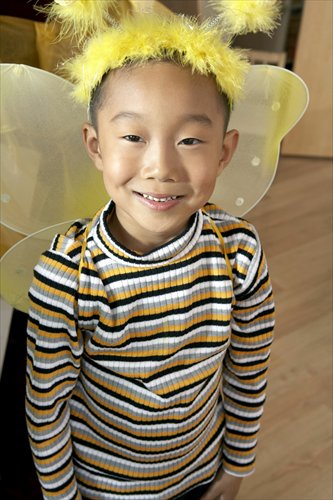Engendering controversy

Childhood gender nonconformity is a phenomenon in which children identify with the opposite gender. Photo: IC
Dressed in a floral shirt with shoulder-length hair, 4-year-old Xiao Han (pseudonym) could hardly be recognized as a boy on his first day of preschool. "Unlike other boys, he is very gentle and sensitive," said Jane Chen (pseudonym), Xiao Han's teacher at a preschool in Chaoyang district she requested not to be named. "If other kids offend Xiao Han, he will ask them to apologize. But overall he is very popular among his peers because he is considerate."
When gender dysphoria occurs in preadolescent children, it is sometimes diagnosed by psychiatrists as gender identity disorder of childhood (GIDC). Although it can come as a shock to parents when their children tell them they don't identify as a boy or girl, GIDC is a rare condition that doesn't necessarily hint at a child's sexuality.
"Xiao Han is a rather extreme example. He was born into a wealthy yet complicated family, and has been raised solely by his mother. I can't say too much about his background because his parents are celebrities, but I won't be surprised if he shows homosexual tendencies in the future," Chen said.
Influence from family
Dou Dou, a teacher at Xinshiji Preschool in Changping district, said that the lack of a paternal influence at home can lead some boys to become effeminate. "It is obvious that girls mature quicker than boys, even at the ages of 3 to 5," she said. "Quite a few boys initially tend to be really dependent and cry a lot, while girls can basically deal with assigned tasks independently. Most kids at preschool have mothers who are housewives and fathers who work. Before some boys enroll at preschool, they might have played with dolls at home."
But Dou stressed that boys exhibiting feminine traits at an early age "isn't a big problem," saying most tend to show more obvious signs associated with masculinity once they reach 5 or 6.
Wang Qinyun (pseudonym), 36, was concerned that his 4-year-old son, Binbin (pseudonym), might have GIDC. "My wife and I worried a lot about Binbin's mental development. He has grown up with his elder cousins, all of whom are girls, which I suspect is the main reason why he acted like a girl since the age of 3," he said. "For example, he wore his cousins' skirts twice and felt very proud of himself on both occasions."
However, Binbin's exploration of his feminine side was only a passing phase. "As he made friends with boys at preschool and heeded instructions from us, he gradually revealed his boyish, mischievous side," Wang said.

Public debate is divided over whether parents or teachers should educate children about gender identity. Photos: IC
Early-life identity crisis
Ni Zhiyong, a psychologist whose specialty is family education, said children can struggle to draw distinct gender boundaries while still in their infancy. "At 1 to 2 years old, children become conscious of physical differences between boys and girls. Before their third birthday, they are easily able to label themselves as either a boy or girl on account of their emerging concept of self," Ni said. "A child's gender identity is stable by 4, when they know they will always be male or female."
For boys like Xiao Han rarely exposed to a male role model, Ni said such an upbringing can lead to mixed messages being sent about gender. "When a father is absent and the mother is the primary caregiver, it's easy for a boy to subconsciously want to mimic the mother and shun the seldom present father. Consequently, the boy is more likely to obey requests from his mother," he said.
China's education authorities are also recognizing the importance of providing stable male role models for young children.
A program training male teachers at preschools, traditionally dominated by female teachers, was launched earlier this year by the Guangxi Zhuang Autonomous Region government to provide suitable male role models for children, the Xinhua News Agency reported in September.
"Preschool children go through an imitation stage, and outside influence is very important. There is a need for a masculine side to education to help them cultivate a well-rounded character," Zhou Hao, a member of the Chinese People's Political Consultative Conference in Guangxi, was quoted saying.
Early childhood education has one of the biggest gender imbalances among teachers, with around 80 percent of primary school teachers in China's first-tier cities being female, according to findings in a 2012 report by Beijing Normal University.
Concerns about gender identity among children linger in China after primary school, too.
In May, the prestigious Shanghai No.8 High School announced the city's first all-boys classes following popular demand from parents to tackle a so-called masculinity crisis.

Public debate is divided over whether parents or teachers should educate children about gender identity. Photos: IC
Debunking sexuality myths
At Chen's preschool, children learn about gender stereotypes to better understand their own identity.
"The concept of gender in children's minds is still ambiguous when they are very young, so we can only teach them how to distinguish between different genders based on appearance," she said.
"We show children flashcards that show short-haired boys wearing light blue clothes and ponytailed girls wearing pink clothes."
However, Dou said there is little point drawing distinct gender lines among children at such a young age. "At our kindergarten, there is a unisex restroom for boys and girls. Children naturally feel curious about the opposite sex. We tell them boys and girls are physically different, just like their mommies and daddies."
Ni noted that divided opinion over whether gender education should be part of the early childhood curriculum reflected different views among parents and society on the issue. "Some scholars argue that teachers should teach gender identity to children between the ages of 3 and 5, while others urge parents to take the responsibility," he said.
A male employee at the Beijing Lesbian, Gay, Bisexual and Transgender (LGBT) Center, who declined to give his name, scoffed at suggestions that gender nonconformity or dysphoria among children and homosexuality might be connected. "Sexual orientation can't be attributed to one's education or family upbringing; it's natural," he said.
George (pseudonym), another employee at the Beijing LGBT Center, said there are some advantages of children exploring their masculine and feminine sides at an early age. "Although this can mean facing more challenges, I think there are also some benefits," he said. "You have a greater opportunity to understand various sexual orientations and gender minorities without being limited to gender stereotypes."
Ni said regardless of whether children struggle to come to grips with their gender, compassion is critical from their families. "The most important role parents can fulfill is being guardians who understand, respect and support their children. Gender education should start with them," Ni said.